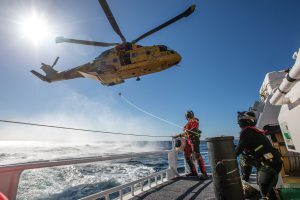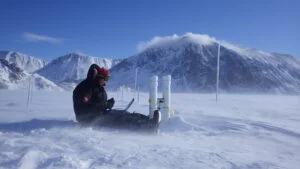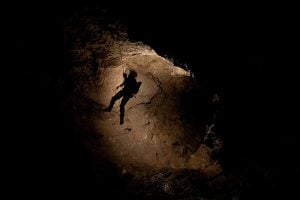
People & Culture
Safety first, service always: The Canadian Coast Guard turns 60
A celebration of the Canadian Coast Guard’s renowned search-and-rescue capabilities — and more — as the special operating agency turns 60
- 4392 words
- 18 minutes
People & Culture
First Officer Leslie Palmer of the Canadian Coast Guard was awarded a Canadian Decoration for Bravery after braving a severe winter storm to rescue two fishermen stranded on the shores of the Grenville Channel, near Prince Rupert, B.C.

On July 20, 1972, the first Canadian Decoration for Bravery was awarded. On the 50th anniversary of the decorations, Canadian Geographic interviews five recipients who have been honoured for their exceptional acts of selflessness. The series forms part of Commemorate Canada, a Canadian Heritage program to highlight significant Canadian anniversaries. It gives Canadian Geographic a chance to look at these points of history with a sometimes celebratory, sometimes critical, eye.

The situation was dire. It was the night of Dec. 27, 2004, and First Officer Leslie Palmer and his fellow crew had sailed the Point Henry, a Coast Guard cutter, through blinding snow and heavy seas to a spot south of Prince Rupert, B.C. Hours earlier, the Coast Guard had received a distress signal from this spot, and the crew of a freighter that had passed by earlier had also called to say they thought they’d seen a light on the beach. But the weather was so bad that Palmer couldn’t even tell how far offshore they were.
Then, using night vision cameras, he saw a flicker of light on the beach. Someone was shining a flashlight into the stormy darkness. Someone was in trouble.
The crew needed to figure out how to reach the beach. They sailed south along the shoreline for about 2.5 kilometres and pulled into a small channel where they could more safely launch a small rescue boat. Hindered by the breaking surf on the beach and wind gusts of up to a hundred knots, Palmer ended up landing half a kilometre from the stranded fishermen. Undeterred by the heavy shore spray icing up the outer shell of his suit, he heaved a backpack of rescue gear from the boat and started to walk, alone, towards the source of the light. “There being a new crew on the vessel at that time, I made the decision as Chief Officer that I would do this venture along the shoreline myself,” he said.
Visibility was zero, and the winds were strong enough to blow Palmer off his feet a few times. The snow along the water’s edge was a metre deep and hard to truck through, so Palmer decided to walk inland. He quickly returned to the shoreline, though, when he realized the wind was snapping branches off the trees over his head. At one point, Palmer paused for a rest against a tree stump to gather his thoughts. “I could feel my heart pumping so hard and had my eyes closed,” Palmer said. Then his eyelids froze up. “I started to think to myself, ‘Oh my freaking god. Have I pushed myself too much? Am I doing the right thing here?’ All these things are rushing through your head.” But Palmer wiped the ice from his eyes and forged ahead. “You push yourself because you know that if you’re in this shape, there’s somebody else in worse shape at the other side.”


After about 20 minutes, Palmer crested a small hill. He could see the beam from a flashlight and heard a man’s voice screaming over the noise of the storm. The man led Palmer to a covered life raft that had been blown onto the beach and was now pinned against a fallen tree. The raft was full of ice and water and a second man lay half-submerged, unconscious and surely freezing to death.
The man in the raft, the skipper on the fishing boat that had capsized, was wearing an immersion suit — a full-body survival garment meant to keep a wearer warm and alive — but the suit had filled with icy water. Palmer and the other man cut the suit off the skipper and put him into a new suit that Palmer had brought with him. “In them conditions, to have him stripped out of that suit and put him into another dry immersion suit was a challenge itself. And I’m pretty fatigued by this time,” Palmer remembered. He placed heat packs in the suit to warm the skipper. “And he was actually coming around a little bit. But it was just mumbles. Nothing was making sense.”
Palmer radioed the Point Henry to let the others know they had two survivors. He told them he needed a second immersion suit, more blankets and hypothermia gear. The crew on the Point Henry loaded a dry bag with the requested gear, attached a light ring to the bag, then tossed it into the water, hoping it would float to shore where the men were waiting. Unfortunately, the surf had different ideas and Palmer had to backtrack down the shoreline to recover the bag. “I almost got back to where I originally started before the bag came ashore and I was able to gather it and make my way back again to where the survivors were,” he said.

The weather improved as morning approached. So did the skipper, who’d regained consciousness with Palmer’s help. A larger Coast Guard vessel arrived on the scene at around four in the morning. The more powerful lights of the large vessel provided hope and Palmer reassured the two men that they’d be rescued soon. “I told them, ‘We’ll be able to get you off the beach. Hang in there.’ I was giving them moral support.” Once the wind died down and conditions on the shoreline improved, the men were brought aboard the Coast Guard ship.
Palmer hardly considers himself that night’s lone hero. “I guess they picked me out because I’d gone to the beach,” Palmer said of the selection committee. “But it’s not just me there.” The crew on the Point Henry and the second Coast Guard vessel all participated in the rescue. “And myself, I always look up to the survivors,” Palmer said. “What they had done to endure the environments they were put in. It’s phenomenal.” Still, receiving the Cross of Valour, which recognizes acts of the most conspicuous courage in circumstances of extreme peril, felt deeply meaningful to Palmer.
Perhaps an even greater tribute came much later when the skipper named his newborn daughter Leslie, after the man who saved his life on the beach. “It was quite an honour,” Palmer said. “I was quite honoured for that to happen.”
Are you passionate about Canadian geography?
You can support Canadian Geographic in 3 ways:

People & Culture
A celebration of the Canadian Coast Guard’s renowned search-and-rescue capabilities — and more — as the special operating agency turns 60

Science & Tech
Celebrating Canadian Innovation Week 2023 by spotlighting the people and organizations designing a better future

Places
In Banff National Park, Alberta, as in protected areas across the country, managers find it difficult to balance the desire of people to experience wilderness with an imperative to conserve it

Exploration
Caving: The ultimate underground sport